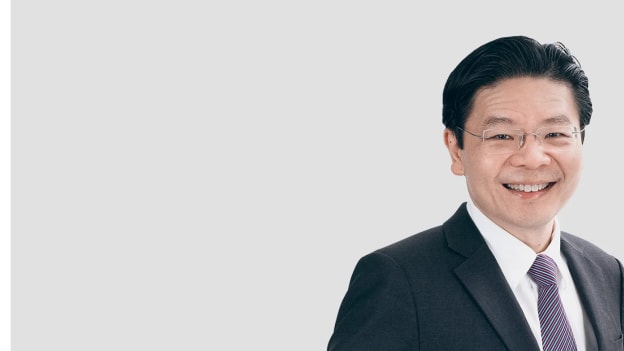What Singapore’s incoming Prime Minister Lawrence Wong says about people and work

On the evening of 15th May, Singapore's fourth prime minister since independence will be sworn in. Deputy Prime Minister and Minister for Finance Lawrence Wong, a former career civil servant who entered politics in 2011, takes the helm from current Prime Minister of two decades, Lee Hsien Loong.
As the hour of handover approaches, what do we know about Wong's approach to the world of people and work? In Singapore's tiny, tight talent market, tone from the top has always been paramount, and the government's attitude – and the example it sets – has always been the main compass needle for what skills and career paths are emphasised, how compensation and benefits are determined, and even what type of organisational culture dominates.
Here are some hints, gathered from Wong's recent speeches and policies.
An emphasis on lifelong learning
An economist by training, Wong has in recent years raised repeated warnings about how global political, social, and macroeconomic shifts are disrupting business and work. He has consistently advocated for upskilling and reskilling of the workforce, and put money behind it as well – his 2024 Budget included a significant overhaul of the national upskilling/reskilling programme, SkillsFuture, with extra funding going to mid-career workers who are most likely to be affected by such disruptions.
“This will become more important with slower economic growth, rapid technological disruptions, and greater job churn,” he commented in an April 2023 speech. “To remain an upwardly-mobile society, lifelong learning will be key. Not just upskilling once and being done with it; but multiple times, to become more adaptable and resilient, well-equipped and confident to face the future.”
He has also spoken about the need for skills-based hiring, and for businesses to invest in the development of their employees, whether by giving them time off to train, or by supporting them with the cost of such training.
“This is not just about reshaping the labour market; it is also about shifting our perceptions towards work, and embracing a broader definition of what counts as ‘good jobs’; for us to recognise skills and competencies rather than be overly focused on paper qualifications,” he said in a 2023 address at IPS Singapore Perspectives.
Greater equitability and proper valuing of all professions
Wong has several times called out Singapore's social leanings toward overachievement and a narrow definition of success, particularly the tendency to value white-collar jobs far more than blue-collar work. He has been a strong supporter of government attempts to narrow the wage gap, an effort that has been ongoing since before the pandemic, and has also highlighted the urgency of opening better career prospects for non-degree-holders.
At the Singapore Economic Policy Forum in 2022, he also said: “We need to see broader change in our economy too. It still places too much of a premium on cognitive abilities – what we deem as “head” work – and does not value sufficiently those engaging in other forms of work, such as technical roles which tend to be more “hands-on” work, or service and community care roles which tend to be more “heart” work.”
And at 2023's May Day Rally, he remarked that the government needs to look into what more can be done to “uplift our lower-wage workers, professionalise skilled trades, and ensure dignity and respect for every job and every worker.”
It echoed a message from earlier in the same year, where he said: “It is not enough to say we will celebrate a variety of professions. Our economic structures, remuneration, and career prospects in various professions must also be consistent with what we value.”
Wong has also linked the pursuit of narrow success and high levels of competitiveness to a general low level of mental health and wellbeing. Commenting on a move to advance mental health earlier this year, he said then: “It’s good to have a culture in Singapore that values hard work and excellence, and encourages everyone to aspire and strive to be better. But we should not be unwittingly drawn into a rat race of hyper-competition and endless comparisons with one another, just to get ahead of others, and end up worse off as a society.”
Making the workforce AI-ready
Wong has actively acknowledged the disruptive qualities of AI, both the positive and the negative: on the one hand its ability to drive innovation, productivity, and incomes, and on the other hand the obsolescence of existing job roles, affecting in particular middle-aged PMETs.
He has warned about the impact on workers, and much of his commentary on lifelong learning has been linked to AI disruption and the need to support workers through multiple career transitions as a result.
At the launch of Singapore's national AI strategy last December, he said: “Knowledge-based work like research, coding and writing were considered safe from disruption in the past. But with AI, that is no longer the case. We do not think this will mean a jobless future. But it does mean significant changes in job roles, and more training for humans to harness AI effectively.”
Support for workers affected by disruptions
With Singapore's small workforce and socio-politically driven restrictions on bringing in external talent, unemployment or underemployment is a resource issue, but also one of simple empathy. Wong has in multiple speeches expressed concern for workers who lose their jobs and how they can best be supported without disincentivising them to re-enter the workforce.
In one 2023 speech, he commented: “We also know that losing a job is a major setback which can easily destabilise workers and their families...we want to design a support scheme that provides assurance but avoids these negative outcomes: a targeted re-employment scheme that will reduce the strain on displaced workers to make ends meet, while still encouraging them to continue with their upskilling and job search.”
Image: Prime Minister's Office, Singapore















